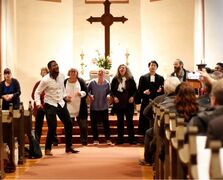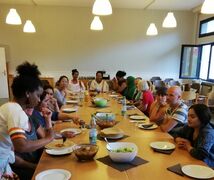06.07.2021

International Worship Service of the International Evangelical Community

International Cooking Group of the International Evangelical Community (Photos: Jonathan Hong)
According to the Wuppertal press office, citizens from 160 different nations live in the city on the Wupper today, or to use another statistic: 40% of the people who live in Wuppertal have a migration background - and the trend is rising.
This social reality is not reflected in the local Protestant congregations in Wuppertal. Contacts are maintained with partner congregations of other languages and origins, such as Namibia, but "within the congregations there are hardly any encounters with people from other cultures, although quite a few of them live in our neighborhoods and some of them are Christians," according to a 2017 concept paper by Matthias Stempfle of the Landeskirchliche Gemeinschaft Wuppertal. "In any case, there is a certain contradiction between the unifying power of the Gospel, which transcends cultural and social boundaries, and a community reality in which the long-established are often largely among themselves," the paper notes.
Against this background, the idea of the model project "International Evangelical Community" was born four years ago. Its task is to bring different spiritualities and cultural backgrounds into the established German evangelical congregations. But not only that, access to the Protestant church is often not made easy for Christians with a migration background - the model project wants to change that. In addition, people with and without a migration background who are far from the church are to be given a low-threshold approach to the Christian faith through intercultural encounters, without appearing to be appropriating.
From the beginning, it was clear that such an innovative project could only be implemented with a full-time person who, as the project pioneer, had a certain intercultural intuition. The greater challenge, however, was initially the question of how to finance an innovative idea, which at this stage still appeared to be a seed. This is where the UEM came in, immediately recognizing the missionary potential of the concept and securing start-up funding of 40,000 euros for the first three years of the church start-up. The church district of Wuppertal also provided support of 10,000 euros per year for the first three years of the project and promised further funding. This turned out to be a stroke of luck for the church start-up project, whose follow-up financing could be taken over by the Wuppertal church district in this way. The seed grew into the International Evangelical Community, which serves as a model for new forms of church.
Today, the start-up is one of the specially funded projects of the so-called trial rooms of the Evangelical Church in the Rhineland. "This is how I would like to see the relationship between mission and the regional church, i.e. the UEM as a trial space before the trial space," said Pastor Dr. Claudia Währisch-Oblau, who as Executive Secretary of the UEM's Evangelism Department secured the start-up funding for the church start-up. Superintendent Ilka Federschmidt was convinced of the importance of the project right from the start: "We are delighted with the project for the promised funding from the regional church, which thus shows that it is opening itself as a learning church for the sake of its diversity to new people and all cultures that are at home in our city. We support this and are happy to continue to provide financial support for this 'development space' in our church district."
The project pioneer was found in 2018 in Daniel Nijkeu, who originally comes from the Protestant Church in Cameroon, a member church of the UEM, and has now come to the Wupper after studying mechanical engineering in Dortmund. In the initial phase of the project, he was initially tasked with observing, perceiving and waiting to see which doors would open for intercultural and interdenominational togetherness in Wuppertal. In a second step, Nijkeu developed needs-oriented offers and networked closely with church and civil society actors in the city.
During the transition from the pioneer to the start-up phase, Rev. Dr. Jonathan Hong from the church district of Wuppertal joined as staff support in 2019. Today, both pioneers organize a regular program, such as an international choir, an international Bible study and an international cooking group, with which intercultural togetherness is lived and which will also be continued in times of Corona digital. Thus, both project pioneers have become crucial reference persons and idea carriers for the local churches in Wuppertal when it comes to connecting to a spirituality of intercultural openness.
At the same time, the organizers of the model project are also aware of the risks associated with the International Evangelical Community and its rather loose connection, since a lasting identification, as offered by the home congregations, is hardly possible. On the other hand, the community format corresponds precisely to the current social trend toward more non-committal and temporary commitments, which many local churches have been feeling for some time in view of declining volunteer numbers.
The unconventional model project was made possible thanks to a support group with broad backing from various evangelical players. These include: the church district of Wuppertal, the Center for Community and Church Development of the Evangelical Church in the Rhineland, the Regional Church Community of Wuppertal, Evangelisch in Sonnborn, the Wuppertaler Stadtmission, the Evangelical Alliance, the Community Service for Mission & Ecumenism - Bergisches Land, as well as the Westphalian Community Association and the UEM.
By the way, Daniel Nijkeu realized through his work in the International Evangelical Community that he wants to change his career in Germany by studying theology. His father serves as a role model for him: he works as a Protestant pastor in Cameroon.
Martina Pauly (UEM spokesperson)
IBAN: DE45 3506 0190 0009 0909 08
SWIFT/BIC: GENODED1DKD
spenden@vemission.org
0202-89004-195
info@vemission.org
0202-89004-0
presse@vemission.org
0202-89004-135
CRDB BANK PLC / Branch 3319
Account# 0250299692300
Swift code: CORUTZTZ
Bank BNI
Account# 0128002447
Swift code: BNINIDJAMDN
info@vemission.org
presse@vemission.org